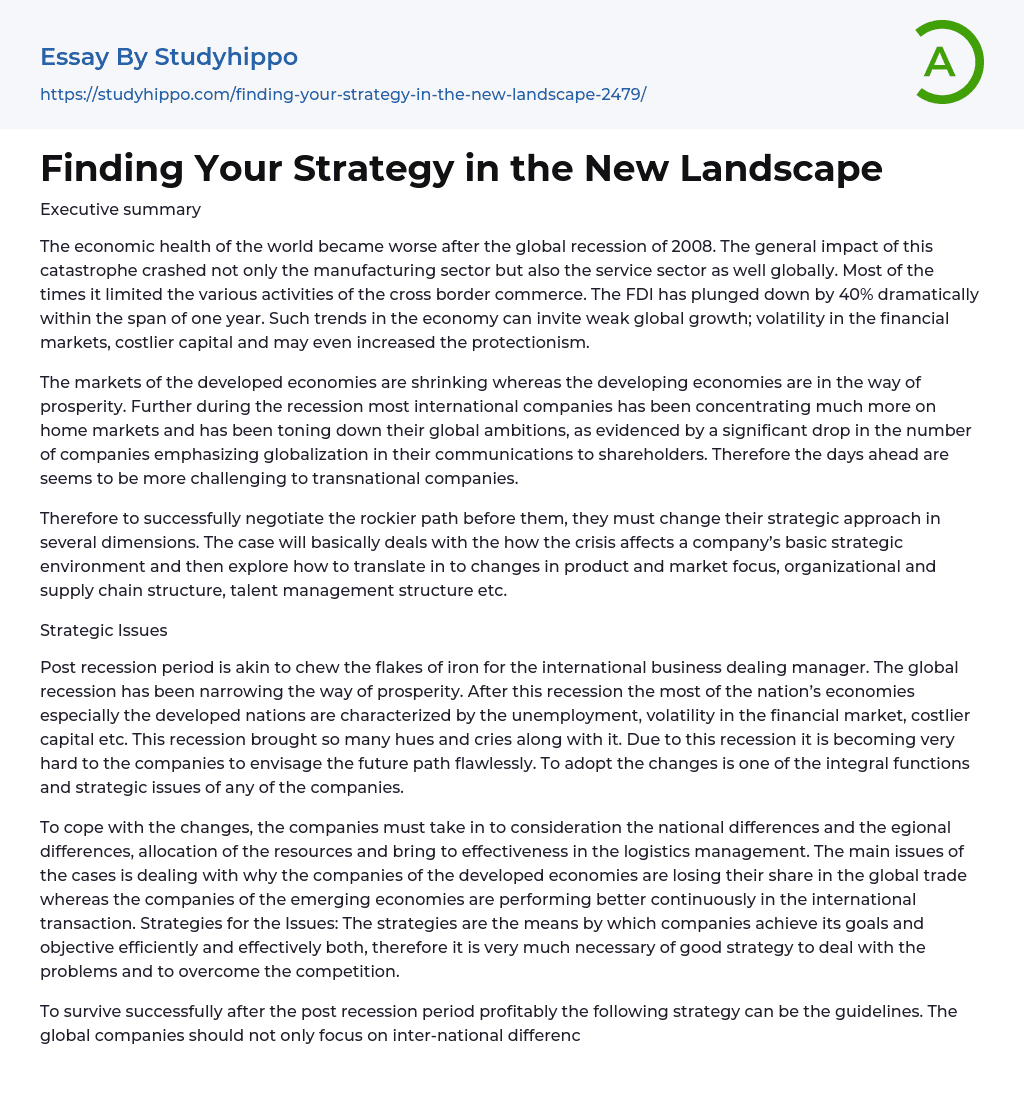Executive summary
The global recession in 2008 had a detrimental effect on the worldwide economy, impacting both manufacturing and service sectors. It significantly constrained international trade and led to a substantial 40% decline in foreign direct investment (FDI) within just one year.
These economic trends may lead to a decrease in global growth, an increase in financial market volatility, higher capital costs, and more prevalence of protectionism. Developed economies are currently shrinking while developing economies are thriving. Additionally, during the recession, many international companies shifted their focus to domestic markets and reduced their global ambitions. This change is evident in the decreased emphasis on globalization when communicating with shareholders. As a result, transnational companies will face increasingly challenging times ahead.
Therefore, in order to navigate the challenging path ahead, it is necessary for international business managers to alter their strategic approach in
...various aspects. The case primarily focuses on how the crisis impacts a company's fundamental strategic landscape, and then examines how this translates into adjustments in product and market focus, organizational structure, supply chain management, talent management, and more.
The post-recession period presents a difficult challenge for international business managers. The global recession has significantly hindered the path to success.
The current state of the majority of economies, particularly in developed countries, is marked by high unemployment rates, volatility in financial markets, and costly capital following the recent recession. This economic downturn has presented significant challenges and obstacles. Consequently, companies are facing increasing difficulty in accurately predicting future outcomes. Adapting to these changes is vital for all companies and a strategic concern. To navigate through these changes successfully, businesses need to take into account national and regional disparities, allocate
resources efficiently, and improve their logistics management. The central focus of this matter revolves around comprehending why companies from developed nations are losing market share in global trade while those from emerging economies consistently excel in international transactions.
Efficient and effective strategies play a crucial role in helping companies achieve their goals and objectives, particularly when it comes to overcoming competition and addressing issues. In order to bounce back financially after the recession, global companies must take into account both international and intra-national differences. It's important to recognize that what works for Maharashtra may not necessarily work for Punjab in India due to the vastness of the country. Instead of solely focusing on manufacturing capabilities, these companies should prioritize meeting the desires of their customers. Success can be attained by expanding business activities in underserved markets, entering new geographical regions with customized products and services, and improving the effectiveness of supply chains. While off-shoring is expected to continue, it's necessary for supply chains to be reconfigured in order to become shorter, simpler, and more resilient.
Recruiting domestic top executives is crucial for understanding country-specific differences. Global companies should prioritize communication methods to keep less connected organizations connected. Decentralization must be implemented for quicker decision-making and regional autonomy. Recommendation: In response to the global recession, global operating companies have adapted strategies to ensure future competitiveness.
The text suggests that companies should incorporate the following guidelines into their strategy:
- Instead of solely relying on foreign investments for returns, firms should invest more time in selecting when and where to invest in foreign opportunities to address the associated risks.
- To succeed in global markets, companies need to consider differences
within countries and be more selective with their investments.
Reliance Telecom in India.
To tap opportunities in the ICT field and reduce costs significantly, globally operating companies should incorporate high-tech solutions and introduce innovation in their supply chains. For example, UPS and Amazon.com are using ICT to assist with logistics management. It is also important to have a multicultural and diverse workforce in the organization to successfully deal with global competitors, take better advantage of foreign opportunities, and achieve a clearer understanding of the conditions in those countries.
The need for increased diversification in management at all levels will arise. Additionally, companies will have to alter their communication methods by incorporating new collaborative tools from the Web. This will enable individuals within more flexible organizations to stay connected with each other.
- American Dream essays
- Barriers To Entry essays
- Capitalism essays
- Central Bank essays
- Compensation essays
- Consumerism essays
- Economic Development essays
- Economic Growth essays
- Economic Inequality essays
- Economic System essays
- Economy essays
- Employment essays
- Export essays
- Finance essays
- Free Trade essays
- Gross Domestic Product essays
- Human Development essays
- Income Inequality essays
- Industry essays
- Inflation essays
- International Business essays
- International Trade essays
- Macroeconomics essays
- Materialism essays
- Max Weber essays
- Microeconomics essays
- Minimum Wage essays
- Monetary Policy essays
- Monopoly essays
- Pricing essays
- Profit essays
- Recession essays
- resources essays
- Taxation essays
- Trade essays
- Unemployment essays
- Warehouse essays
- World economy essays
- Business Analysis essays
- Business Plan essays
- Community Development essays
- Competition essays
- Effective Leadership essays
- Leadership Styles essays
- Mission Statement essays
- Negotiation essays
- Outsourcing essays
- Planning essays
- Public relations essays
- Reasoning essays




